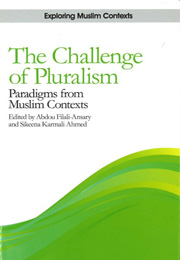Book contents
- Frontmatter
- Contents
- Introduction: Theoretical Approaches to Cultural Diversity
- PART ONE THE HERITAGE: HISTORICAL CONTEXTS
- PART TWO CONTEMPORARY THOUGHT
- 3 Civil Society and Conflict Management: Bangladesh's Experiences
- 4 Pluralism and Liberalism in Contemporary Islamic Thought
- 5 Democracy, Pluralism and Political Islam
- 6 Islam, Conflict and Democracy
- 7 The Diversity of Cultures in the Crucible of Globalisation
- About the Contributors
- Index
6 - Islam, Conflict and Democracy
from PART TWO - CONTEMPORARY THOUGHT
Published online by Cambridge University Press: 12 September 2012
- Frontmatter
- Contents
- Introduction: Theoretical Approaches to Cultural Diversity
- PART ONE THE HERITAGE: HISTORICAL CONTEXTS
- PART TWO CONTEMPORARY THOUGHT
- 3 Civil Society and Conflict Management: Bangladesh's Experiences
- 4 Pluralism and Liberalism in Contemporary Islamic Thought
- 5 Democracy, Pluralism and Political Islam
- 6 Islam, Conflict and Democracy
- 7 The Diversity of Cultures in the Crucible of Globalisation
- About the Contributors
- Index
Summary
There is a very familiar cautionary response that one finds oneself constantly making when engaging in discussions about Islam these days. This is the response of saying, “There are many Islams!” In fact, this has become something of a mantra and, given the strenuous simplifications one finds in the media and on the lips and in memos of politicians, as well as in continuing forms of “orientalist” academic writing, expressions of such caution are thoroughly warranted. However, it should not become a conversation-stopper; nor should it be inconsistently deployed. There is no doubt that there are many Islams. That should be a banality. If that is so, then, equally, there are many Americas, and there are many Wests, too. That does not stop many of us from making remarks abstracting from this many-ness and diversity of the West and of America to make roughly true generalisations about the West. For example, that there is a corporate-driven foreign policy prevalent in the West, especially in the US, which has had very destructive effects in countries with Muslim populations; that the US government has consistently supported Islamic militants when it suited their geo-political and economic interests; that it has supported Israeli occupation and brutalisation of the Palestinian land and peoples; and so on. These are all things that we insist on saying, even as we acknowledge that there are many Wests, many Americas, with diverse interests and commitments, and the like.
- Type
- Chapter
- Information
- The Challenge of PluralismParadigms from Muslim Contexts, pp. 78 - 93Publisher: Edinburgh University PressPrint publication year: 2009



